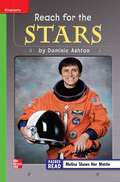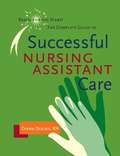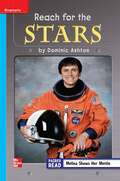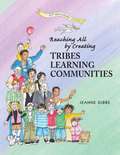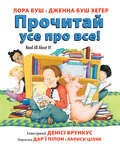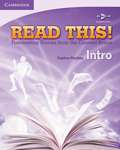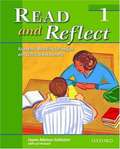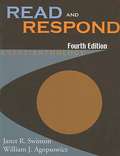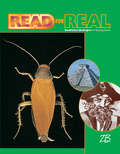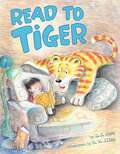- Table View
- List View
Reach for the Stars! The Complete Guide to Successful Nursing Assistant Care
by Diana L. DuganA student-friendly text, Reach for the Stars! The Complete Guide to Successful Nursing Assistant Care reflects Diana Dugan's 15 years of experience teaching nursing assistants in community colleges, proprietary schools, and long-term care facilities. This comprehensive textbook to train nursing assistants teaches all state, federal, and safety requirements. It is beautifully illustrated and clearly photographed with color tabs for easy location of material. This book emphasizes safety, privacy, and respect before and after providing care. Organized around learning objectives, it contains creative methods to teach care and related observations, ways to promote independence, essential information on preventing abuse and neglect, and chapter-ending material which develops critical thinking, encourages research, and organizes study tasks as well as tests the chapter.
Reach for the Stars: The Story of the Three-Year Swim Club (Fountas & Pinnell Classroom, Guided Reading Grade 4)
by Alice Cary Ron RandallNIMAC-sourced textbook
Reaching All by Creating Tribes Learning Communities
by Jeanne GibbsReaching All by Creating Tribes Learning Communities blends the fields of group process and cooperative learning; prevention and resiliency; learning theory and school change into a comprehensive, meaningful whole. This readable, useable, wonderful book is not just a set of activities to build community. Jeanne Gibbs and her colleagues incorporate the latest research on teaching and learning. They illustrate specifically how the Tribes process applies to a variety of school and organizational needs. Most importantly, they help the reader to feel hopeful and proud to be working and learning together with children and with each other.
Read 180: Rbook Flex
by Scholastic StaffA student workbook that provides instruction in reading comprehension, vocabulary, and writing and grammar skills.
Read All About It! (Ukrainian Edition)
by Laura Bush Jenna Bush HagerTranslated by Dasha Peipon, writer, editor and teacher, who’s originally from Ukraine, and Larysa Tsilyk, a Ukrainian poet, HarperCollins Children’s Books is happy to make available in ebook format this picture book in the Ukrainian language for no charge in the hopes that it will bring joy to displaced Ukrainian children and their families.A classroom adventure that will have readers racing to the shelves, from Mrs. Laura Bush and her daughter Jenna!Tyrone rules the school! He's king of the monkey bars, a math machine, and a science whiz.The only thing he doesn't like about school is reading. It's so boring! But when strange visitors start dropping by the classroom during story hour, Tyrone discovers there's more to books than just words on pages.
Read Between the Lines (Fountas & Pinnell Classroom, Guided Reading Grade 4)
by Michael Sullivan Marcos CaloNIMAC-sourced textbook
Read This! Intro Student's Book: Fascinating Stories From The Content Areas
by Daphne MackeyRead This! is a four-book reading series designed for adult and young adult ESL students at the high beginning to intermediate levels. Read This! Intro contains fifteen fascinating stories relating to the fields of Education, Sociology, Science, Marketing, and TV and Film Studies. For example, students read about schools in which students, not teachers make the rules; apartments that are designed to be difficult to live in; and reality TV shows in which the audience likes the meanest judges the best. These non-fiction stories are written in an accessible narrative style and are appropriate for high beginning students. Illustrated with attractive color photos, this low-level reading book will motivate even the lowest level reading students to start reading content-rich texts.
Read and Reflect 1: Academic Reading Strategies and Cultural Awareness
by Jayme Adelson-Goldstein Lori HowardThis book is ideal for young adults planning to pursue a college education; however, it can also be used by students who want to improve their reading skills to attain a personal goal or to advance in the workplace.
Read and Respond: A Text/Anthology (Fourth Edition)
by Janet R. Swinton William J. AgopsowiczRead and Respond gives the students a step-by-step method to improve their skills in reading, summarizing, and responding in writing.
Read and Think: Skill Sheets 3
by Matilda NordtvedtThis book is a collection of reading exercises with a set of questions related to the topics under each section.
Read for Real: Nonfiction Strategies for Reading Results
by Leslie W. Crawford; Charles E. Martin; Vocabulary and Fluency Consultant ;English Language Learner Specialist ;Strange and Wonderful Creatures The Human Story In and On Stone Pirates on the High Seas Great Races The Changing Ea Pioneers in Technology
Read for Real: Nonfiction Strategies for Reading Results, Level B
by Charles E. Martin Leslie W. Crawford Margaret M. PhilbinNIMAC-sourced textbook
Read for Real: Nonfiction Strategies for Reading Results, Level C
by Charles E. Martin Leslie W. Crawford Margaret M. PhilbinNIMAC-sourced textbook
Read for Real: Nonfiction Strategies for Reading Results, Level D
by Charles E. Martin Leslie W. Crawford Margaret M. PhilbinNIMAC-sourced textbook
Read for Real: Nonfiction Strategies for Reading Results, Level E
by Charles E. Martin Leslie W. Crawford Margaret M. PhilbinNIMAC-sourced textbook
Read for Real: Nonfiction Strategies for Reading Results, Level F
by Charles E. Martin Leslie W. Crawford Margaret M. PhilbinNIMAC-sourced textbook
Read for Real: Nonfiction Strategies for Reading Results, Level F
by Charles E. Martin Leslie W. CrawfordNIMAC-sourced textbook
Read for Real: Nonfiction Strategies for Reading Results, Level H
by Charles E. Martin Leslie W. CrawfordNIMAC-sourced textbook
Read the Signs (Into Reading, Level D #65)
by Sheila Bailey Abby JacksonFox and his friends are walking in the woods. But only Fox knows how to read the signs. What change is coming?
Read to Tiger
by S. J. ForeIn this delightful role-reversal story, all the serious little boy wants is to settle down quietly and read his book. But that’s not so easy when there’s an imaginative tiger with an excess of energy behind the couch, wanting attention and someone to play with. Repetitive refrains and sound effects make this a perfect read-aloud, and the sweet and cozy ending will delight the heart of any book-lover.

